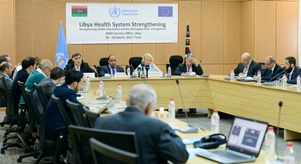
29 March 2017 – Today the European Union (EU) and WHO launched a new programme to support the Libyan Ministry of Health to maintain and strengthen health services across the country.
This new programme, running over 24 months with a contribution of € 3.6 million from the EU, targets 2 key aspects of Libya's health system – supply chain management and health information systems. Libya's health system has been deeply affected by the conflict at all levels, causing acute shortages of life-saving medicines. In many places major hospitals and warehouses for medical supplies have been destroyed and health professionals have been forced to flee.
This EU-funded programme will assist the Libyan Ministry of Health in carrying out evidence-based procurement, storage and distribution of life-saving medicines and supplies. The project will also support the Ministry into generating health-related data to inform decision-making indispensable to better prepare Libya's health system to withstand crisis and serve its citizens at this difficult juncture.
“Strengthening the Libyan health system is a major focus of the EU support to the Libyan people across the country. Today health professionals are facing enormous challenges as they are committed to keeping up services for patients. Those bearing the brunt of the conflict are patients afflicted by serious illness and their supportive families," said Ambassador Bettina Muscheidt, adding, "The EU and WHO are joining forces to strengthen the capacity of Libya's health system. As part of this programme, we will jointly help the Ministry of Health to also rehabilitate 8 warehouses damaged by the conflict thus restoring critical storage capacity and make life-saving medicines more readily available where and when they are needed. Today's meeting here with health professionals coming from all parts of Libya, east, south and west is a powerful testimony of commitment and unity – and their accounts are telling: Libya's conflict must end, for the sake of its people and the most vulnerable among them, patients and the displaced.”
The programme will further complement ongoing efforts by the Libyan Ministry of Health and WHO to restore capacities to offer optimal health services to the Libyan population.
“The EU is the major donor in the health sector in Libya and to the WHO. This grant will ensure that 2 important pillars of the health system are strengthened enabling the Libyan Ministry of Health to procure standard medicines and supplies effectively, timely and efficiently. It will also help generate evidence-based health information to inform major decisions in health care delivery,” said Dr Jaffar Hussain, WHO Representative and Head of Mission to Libya and Tunisia. “Libya needs such support to build the required institutional capacities that are currently lacking”.
The project will build national and local level capacities through a structured mechanism by engaging senior and mid-level decision-makers from the Libyan Ministry of Health in critical decision-making processes, so that decisions are made based on evidence and national needs. The first Steering Committee meeting, which is the programme decision-making body, is held on 28 March to ensure that the EU, the Libyan Ministry of Health and WHO jointly identify and agree on modalities for smooth project implementation.


